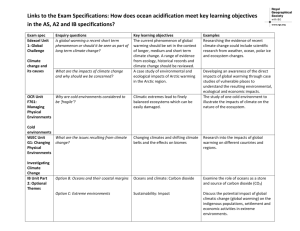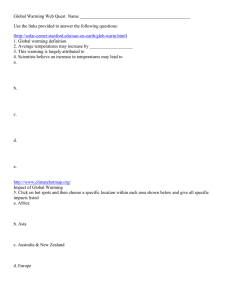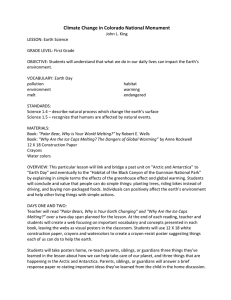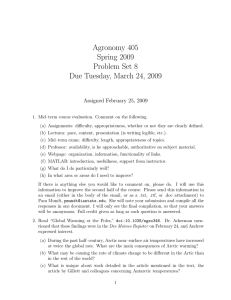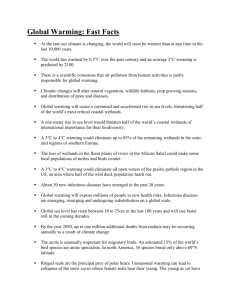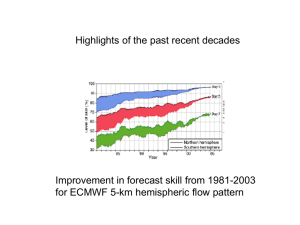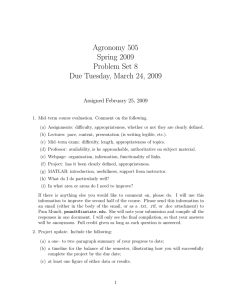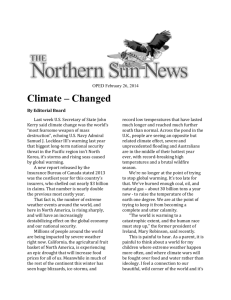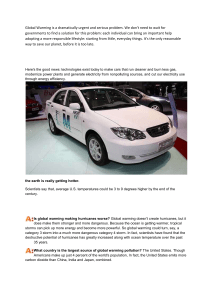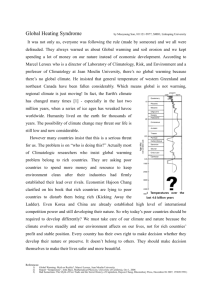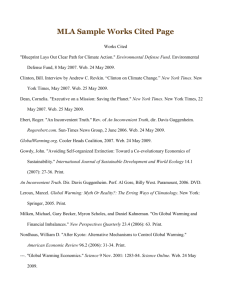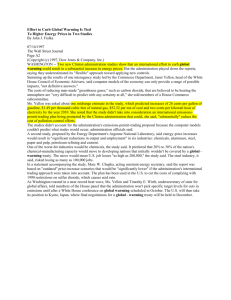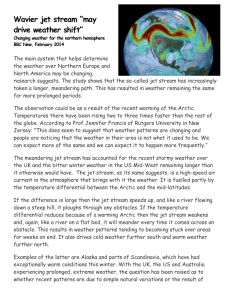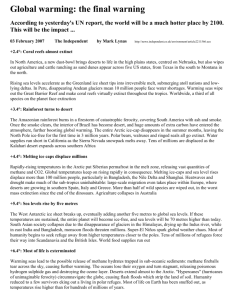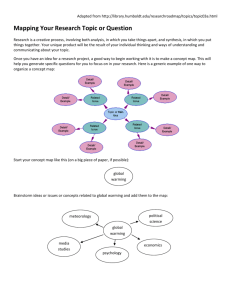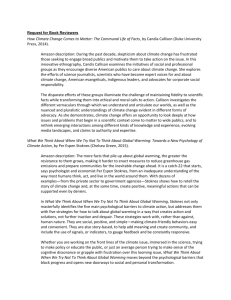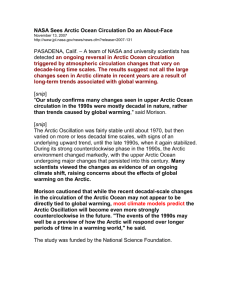Will We Act in Time?
advertisement
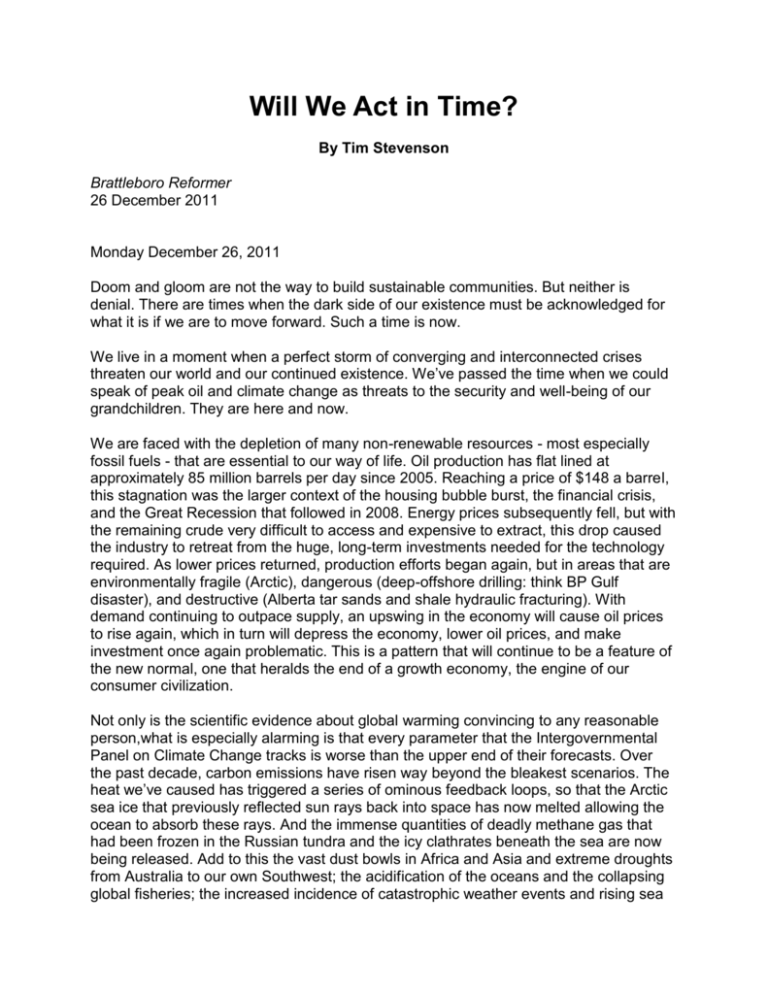
Will We Act in Time? By Tim Stevenson Brattleboro Reformer 26 December 2011 Monday December 26, 2011 Doom and gloom are not the way to build sustainable communities. But neither is denial. There are times when the dark side of our existence must be acknowledged for what it is if we are to move forward. Such a time is now. We live in a moment when a perfect storm of converging and interconnected crises threaten our world and our continued existence. We’ve passed the time when we could speak of peak oil and climate change as threats to the security and well-being of our grandchildren. They are here and now. We are faced with the depletion of many non-renewable resources - most especially fossil fuels - that are essential to our way of life. Oil production has flat lined at approximately 85 million barrels per day since 2005. Reaching a price of $148 a barrel, this stagnation was the larger context of the housing bubble burst, the financial crisis, and the Great Recession that followed in 2008. Energy prices subsequently fell, but with the remaining crude very difficult to access and expensive to extract, this drop caused the industry to retreat from the huge, long-term investments needed for the technology required. As lower prices returned, production efforts began again, but in areas that are environmentally fragile (Arctic), dangerous (deep-offshore drilling: think BP Gulf disaster), and destructive (Alberta tar sands and shale hydraulic fracturing). With demand continuing to outpace supply, an upswing in the economy will cause oil prices to rise again, which in turn will depress the economy, lower oil prices, and make investment once again problematic. This is a pattern that will continue to be a feature of the new normal, one that heralds the end of a growth economy, the engine of our consumer civilization. Not only is the scientific evidence about global warming convincing to any reasonable person,what is especially alarming is that every parameter that the Intergovernmental Panel on Climate Change tracks is worse than the upper end of their forecasts. Over the past decade, carbon emissions have risen way beyond the bleakest scenarios. The heat we’ve caused has triggered a series of ominous feedback loops, so that the Arctic sea ice that previously reflected sun rays back into space has now melted allowing the ocean to absorb these rays. And the immense quantities of deadly methane gas that had been frozen in the Russian tundra and the icy clathrates beneath the sea are now being released. Add to this the vast dust bowls in Africa and Asia and extreme droughts from Australia to our own Southwest; the acidification of the oceans and the collapsing global fisheries; the increased incidence of catastrophic weather events and rising sea levels; and the growing food crisis being experienced by people in the "developing" world who are least responsible for global warming. And this is only the short list. What is most disturbing, however, is the continuing failure of our society to engage in commensurate action. This is reflected by candidates for high office who deny reality, a Congress which has stonewalled any attempt at progressive legislation, and a President who has not kept promises he made when he was a "green" candidate, but who has, instead, obstructed efforts to achieve viable international policy to reduce carbon emissions. None of this is surprising, of course, in light of the elaborate disinformation campaign that has been underwritten by the energy industry, as well their vast lobbying efforts that in 2009 set a new record of $154 million. There are powerful interests that want to maintain their profitable status quo. But the failure to act decisively cannot be laid exclusively at the doors of politicians and corporations. This is a societal disconnect, one that is both pervasive and profound, afflicting even those amongst us who have solar panels and bike to work. It’s interesting, for example, that at the same time the clear and present danger outlined above has been unfolding, several polls have found a dramatic drop in the percentage of Americans concerned with climate change, or who believe that global warming was taking place because of human activity, and who stated, instead, that it did not pose a serious threat to the public in their lifetime. While greatly disheartening, this head-in-the-sand posture is also understandable. As the historically unprecedented transformation that we’ve already entered becomes increasingly recognized for what it is -- the end of the way of life that we’ve always taken for granted: the loss of what we consider normal -- the greater our need to deny such drastic change. It’s only when our backs are against the wall and we have no choice that we’ll act in the ways we need to be doing now. Humans by nature wait to do what we should do until the crisis is imminent - the heart attack syndrome. Then we act. Whether this will be soon enough to avoid total catastrophe, we don’t know. But our past history tells us that we are capable of amazing things when faced with a crisis; and what seemed impossible earlier can become the daily routine. Inconceivable as it may presently appear, the American way of life is, in fact, negotiable. In the meantime, what do we do between now and then? Has all that we have been attempting to transition to a post petroleum world been a waste of time, and would we be better advised to do nothing until the crisis hits full bore? Of course not. What we do right now is very important -- it’s the necessary skim on the pond that allows for the 10 feet of ice that people will need to create when we no longer have any choice but to act. We’ll explore this skim building in greater depth next month. Tim Stevenson is the Founding Director of Post Oil Solutions.
